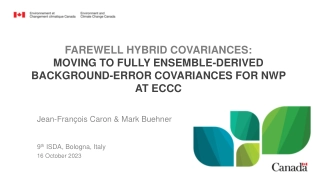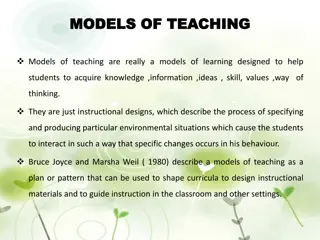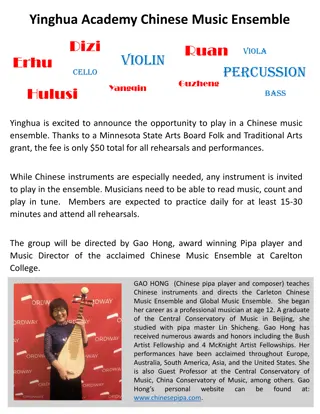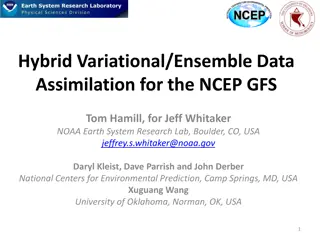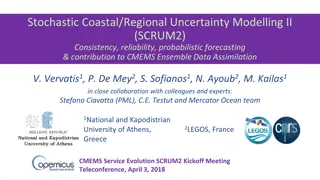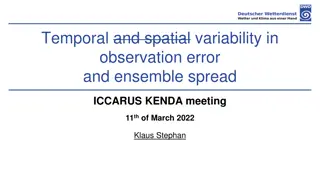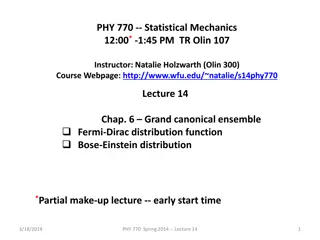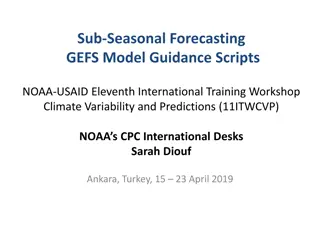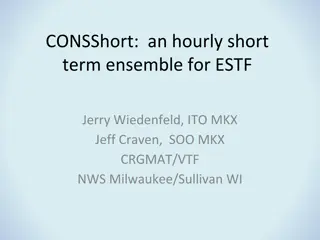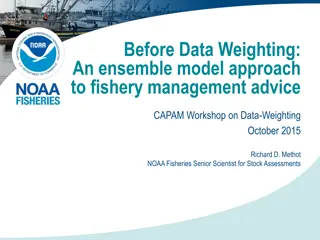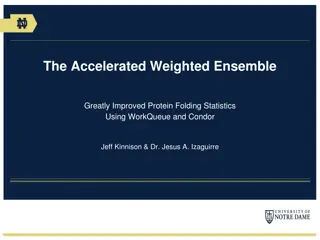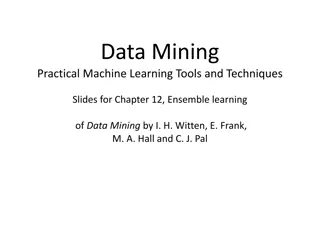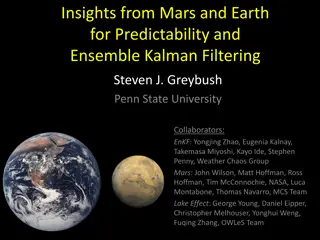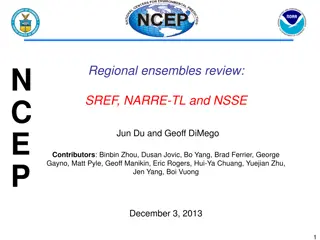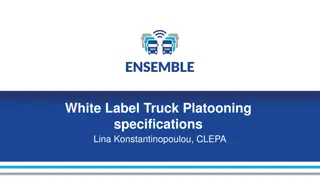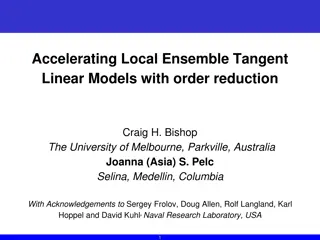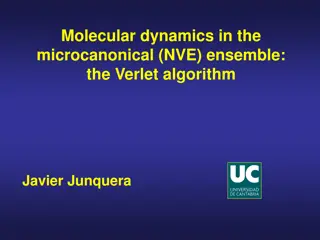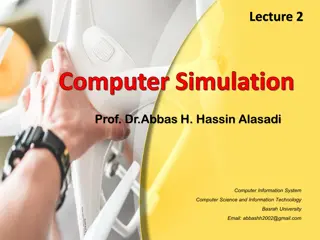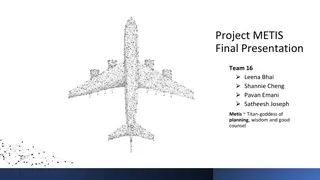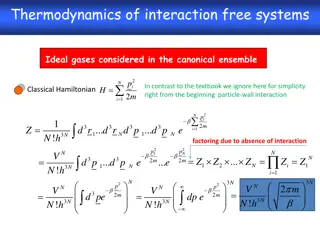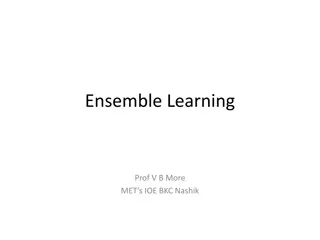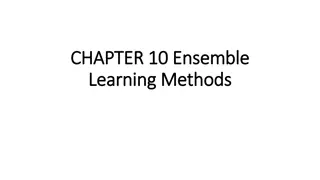Moving Towards Fully Ensemble-Derived Background-Error Covariances for NWP at ECCC
The transition from hybrid covariances to fully ensemble-derived background-error covariances for Numerical Weather Prediction (NWP) at Environment and Climate Change Canada (ECCC) is explored in this paper. It discusses the evolution of covariance formulations, the use of scale-dependent localizati
1 views • 20 slides
System Models in Software Engineering: A Comprehensive Overview
System models play a crucial role in software engineering, aiding in understanding system functionality and communicating with customers. They include context models, behavioural models, data models, object models, and more, each offering unique perspectives on the system. Different types of system
6 views • 33 slides
Models of Teaching for Effective Learning
Models of teaching serve as instructional designs to facilitate students in acquiring knowledge, skills, and values by creating specific learning environments. Bruce Joyce and Marsha Weil classified teaching models into four families: Information Processing Models, Personal Models, Social Interactio
1 views • 28 slides
Join the Yinghua Academy Chinese Music Ensemble Today!
Exciting opportunity to join the Yinghua Academy Chinese Music Ensemble led by award-winning director Gao Hong. Play Chinese instruments in a supportive environment at a minimal fee of $50. Rehearse, perform, and learn the rich tradition of Chinese classical music. Enhance skills, make new friends,
1 views • 14 slides
Hybrid Variational/Ensemble Data Assimilation for NCEP GFS
Hybrid Variational/Ensemble Data Assimilation combines features from the Ensemble Kalman Filter and Variational assimilation methods to improve the NCEP Global Forecast System. It incorporates ensemble perturbations into the variational cost function, leading to more accurate forecasts. The approach
1 views • 22 slides
Stochastic Coastal Regional Uncertainty Modelling II (SCRUM2) Overview
SCRUM2 project aims to enhance CMEMS through regional/coastal ocean-biogeochemical uncertainty modelling, ensemble consistency verification, probabilistic forecasting, and data assimilation. The research team plans to contribute significant advancements in ensemble techniques and reliability assessm
0 views • 28 slides
Insights on Observation Error, Ensemble Spread, and Radar Reflectivity in Meteorological Analysis
Explore topics such as temporal and spatial variability in observation error, ensemble spread analysis, baseline observations at DWD, estimation of observation errors, and radar reflectivity analysis. Gain insights into data processing and interpretation in meteorological studies.
0 views • 26 slides
Grand Canonical Ensemble in Statistical Mechanics: Fermi-Dirac Distribution
Exploring the Fermi-Dirac distribution function and the Bose-Einstein distribution in the context of the grand canonical ensemble for non-interacting quantum particles. The lecture delves into the impact of particle spin on energy spectra, enumeration of possible states, self-consistent determinatio
1 views • 33 slides
NCEP GEFS Sub-Seasonal Forecasting Exercise
In this exercise, you will generate NCEP GEFS deterministic week 1 and week 2 forecasts for precipitation and temperature anomaly. The practical steps include downloading the necessary data and scripts, extracting the files, and accessing the GEFS model guidance. This exercise focuses on understandi
0 views • 12 slides
Hourly Short-Term Ensemble for Milwaukee/Sullivan, WI
Observations and models are blended to create an hourly short-term ensemble forecast for Milwaukee/Sullivan, WI. The ensemble includes elements like temperature, dew point, wind, precipitation, and more, providing valuable data for up to 24 hours ahead. Various models and observations are used in th
0 views • 37 slides
Innovative Approach for f5C Detection using Ensemble Neural Networks
Epigenetic modification 5-formylcytidine (f5C) plays a crucial role in biological processes. This study introduces f5C-finder, an ensemble neural network model, utilizing multi-head attention for precise f5C identification. By combining five distinct features extraction methods into an ensemble lear
0 views • 23 slides
Ensemble Modeling in Fishery Management: Insights from CAPAM Workshop
Structural uncertainty dominates fishery management decisions as discussed in the CAPAM workshop on data-weighting. The workshop highlighted the importance of ensemble modeling, protocols for ensemble membership, and communication of ensemble distributions for effective decision-making. Various case
0 views • 17 slides
Accelerated Weighted Ensemble for Improved Protein Folding Statistics
The Accelerated Weighted Ensemble (AWE) approach addresses the challenges faced by traditional molecular dynamics (MD) simulations in generating statistically significant kinetic data for protein folding. By utilizing methods such as WorkQueue and Condor, AWE enhances efficiency and accuracy in stud
2 views • 14 slides
Ensemble Learning in Data Mining: Tools and Techniques
Ensemble learning in data mining involves combining multiple models to improve predictive performance. Techniques such as bagging and boosting are utilized to create a single, more accurate model from diverse experts. The bias-variance decomposition is employed to analyze the impact of training set
1 views • 15 slides
Insights from Mars and Earth for Predictability with Ensemble Kalman Filtering
A collaborative effort between Penn State University and various teams explores the predictability of Martian and Earth weather phenomena using ensemble Kalman filtering. A comparison of key characteristics between Earth and Mars is provided, shedding light on their variable atmospheres and climates
1 views • 31 slides
NCEP Regional Ensembles Review Summary
Completed WCOSS transition of both SREF and NARRE-TL in production, with upgrades and fixes for improved ensemble forecasting. Delivered interim upgrade packages for SREF, planned future upgrades, and introduced an experimental NCEP Storm-Scale Ensemble. Performance evaluation in a heavy rain event
1 views • 20 slides
Overview of White Label Truck Platooning Specifications
White Label Truck Platooning involves driving trucks at short inter-vehicle distances for extended periods, creating a system of interconnected systems with specific requirements. The driver cannot be solely responsible for immediate intervention during critical events, necessitating a unique automa
1 views • 8 slides
Grandpa Dan and Other Characters' Musical Ensemble
Ensemble featuring Grandpa Dan on the bass, Nicki on the glockenspiel, various other characters playing unique instruments like the guiro, finger cymbals, and more, all coming together to create a harmonious symphony. Enjoy the orchestration of different sounds and characters in this delightful perf
0 views • 9 slides
Accelerating Local Ensemble Tangent Linear Models
This research focuses on accelerating Local Ensemble Tangent Linear Models with order reduction, exploring methods, results, and implications for advancing numerical modeling in atmospheric and oceanic systems. The study addresses challenges in maintaining accurate TLMs and adjoints for coupled mode
1 views • 21 slides
Molecular Dynamics in NVE Ensemble: Equations and Conservation Laws
In this resource, learn about molecular dynamics in the microcanonical ensemble using the Verlet algorithm, equations of motion for atomic systems, Hamiltonian/Lagrange equations, conservation laws, and time reversibility. The content details solving ordinary differential equations and the standard
0 views • 28 slides
Ensemble of Trees: Boosting, Bagging, and Random Forest
Ensemble of Trees explores various tree-based methods such as CART, MARS, Boosting, Adaboost, Gradient Boosting, Bagging, and Random Forest. It delves into the concept of partitioning the feature space, fitting simple models in rectangles, recursive vs. non-recursive partitioning, regression trees,
0 views • 49 slides
Data Mining
Ensemble learning in data mining involves combining multiple models to improve predictive performance. Techniques such as bagging and boosting are utilized to create a single comprehensive structure from diverse experts. Bias-variance decomposition is used to analyze the impact of training set restr
0 views • 28 slides
Computer Simulation Models Classification
Computer simulation models are classified based on various characteristics such as static or dynamic, deterministic or stochastic, and discrete or continuous. Static models represent systems at a specific point in time, while dynamic models depict changes over time. Deterministic models involve no r
0 views • 8 slides
Selection of Sub-Ensemble for EDF Climate Service
This selection focuses on creating a sub-ensemble of CMIP6 climate projections for the EDF in-house climate service. The criteria involve representation of the whole CMIP6 ensemble, inclusion of independent models, historical performance evaluation, and incorporating low probability high impact scen
0 views • 12 slides
Intensive Course on Ensemble Kalman Filter for Advanced Data Assimilation
Learn about the Ensemble Kalman filter and its applications in estimating system states from observations, including the 4DVar method, advantages, disadvantages, and sequential data assimilation techniques. Explore the Kalman filter for evolving state uncertainties over time
0 views • 20 slides
Ensemble Methods in Machine Learning
Ensemble methods in machine learning involve combining multiple classifiers to improve accuracy and diversity. By leveraging statistical, computational, and representational reasons, ensemble methods can effectively address the limitations of individual classifiers. Bayesian Voting is one such metho
0 views • 20 slides
Microstructural Evolution in Materials: Canonical Ensemble Explanation
Explore how canonical ensemble maintains constant temperature and volume, leading to thermal equilibrium and energy distribution in systems. Learn the model for deriving canonical distribution and examples of macrostates and microstates. Discover the intricate balance of energy levels and configurat
0 views • 34 slides
Understanding Ensemble Methods for Bias and Variance in Machine Learning
Explore the concepts of bias and variance in machine learning models, along with the solutions provided by bagging and boosting techniques. Learn about bagging through Bootstrap Aggregation and boosting using Gradient Boosted Trees to balance bias and variance in predictive models. Discover the adva
0 views • 28 slides
Boosting vs. Bagging for Model Comparison and Merging
Explore the comparison between bagging and boosting methods in model merging for enhanced predictive power. Discover how ensemble techniques like averaging, maximum, and voting can further improve model accuracy. Implementation tools such as JMP Pro and SAS Enterprise Guide are discussed, showcasing
0 views • 29 slides
Flight Delay Prediction with Ensemble Model and Feature Engineering
Explore how Team 16 leveraged feature engineering and ensemble modeling to predict flight delays, tackling an imbalanced classification problem. Dive into their business case, EDA insights, ML pipeline stats, and next steps in this comprehensive project presentation.
0 views • 26 slides
Understanding Ensemble Methods in Machine Learning
Discover the world of ensemble learning through this comprehensive guide by Md. Azizul Hakim. Learn about the importance of bias-variance tradeoff, various ensemble techniques, and the need for ensemble learning in predictive modeling projects. Explore the concept of weak learners and how ensemble m
1 views • 24 slides
Ensemble Predictive Analytics for Economists: Benefits and Methods
Discover the benefits of combining forecasts in predictive analytics for economists. Learn about ensemble predictions, bagging, boosting, and various methods to improve accuracy in both prediction and classification problems. Explore techniques such as Nelson and Granger-Ramanathan ensembles, along
0 views • 9 slides
Thermodynamics of Interaction-Free Ideal Gases in Canonical Ensemble
Explore the thermodynamics of interaction-free ideal gases within the canonical ensemble, focusing on classical Hamiltonian, Helmholtz free energy, quantum-mechanical considerations, and solutions for a monatomic ideal gas. Delve into the partition function, eigenenergies, and wave-number implicatio
0 views • 7 slides
Understanding Ensemble Learning for Improved Predictions
Explore the concept of Ensemble Learning, where multiple learners collaborate to enhance predictive accuracy. Discover how combining diverse classifiers can lead to robust machine learning models, illustrated through real-life examples like Kaun Banega Crorepati.
0 views • 35 slides
Edge-Centric Ensemble Scheme for Query Assignment
Explore an ensemble scheme for queries assignment in the Internet of Things era. Research focuses on managing data streams at the edge, utilizing Edge Nodes as distributed data repositories. Learn about query allocation, Query Controllers, complexity classification, and decision-making for load dist
1 views • 21 slides
Understanding Ensemble Learning with Decision Trees and Boosting Methods
Explore the concept of ensemble learning through decision trees and boosting methods in this comprehensive guide. Learn about techniques for improving classification accuracy, such as bagged trees and boosted trees like AdaBoost and Gradient Tree Boosting.
0 views • 17 slides
Effective Ensemble Learning Methods for Improved Performance
Discover the power of ensemble learning methods in machine learning to combine the capabilities of weak learners and create high-performance models. Explore bagging, random forest, and more techniques to enhance model accuracy and performance.
0 views • 53 slides
Understanding Ensemble Methods in Machine Learning
Explore ensemble methods such as Bagging and Boosting in machine learning, along with an overview of related topics like the Bias-Variance Tradeoff. Learn about different types of Boosting algorithms and how they can help address the bias-variance tradeoff in model complexity.
0 views • 26 slides
Ensemble Methods and SuperLearning in R
Explore the concept of ensemble learning, where multiple algorithms are combined to enhance predictions, with a focus on Super Learning implementation in R. Learn how this approach mirrors seeking multiple opinions before making a crucial decision, leading to more informed choices in automated decis
0 views • 25 slides
Ensemble in Physical Chemistry: Understanding System Evolution & Equilibrium
Explore the concept of ensemble in physical chemistry through the evolution of systems over time, equilibrium dynamics, and the statistical replication of sub-systems. Discover how various ensembles such as the microcanonical, canonical, and grand canonical play a role in describing systems in stati
0 views • 21 slides
